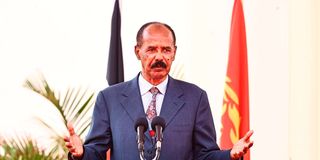Afwerki: Somalia's peace should be in everyone's interest

Eritrean President Isaias Afwerki.
What you need to know:
- Ethiopia has been a key part of previous African Union missions and had expressed interest in remaining part of Aussom. But Somali officials had vowed to exclude Ethiopia before the Ankara Declaration.
Eritrea's leader Isaias Afwerki says it is in everyone's interest to maintain peace with Somalia, arguing that it can help countries in the Horn of Africa to stabilise a troubled region.
As the world celebrated Christmas on Wednesday, Somali President Hassan Sheikh Mohamud travelled to Asmara, Eritrea, where he met Afwerki.
This was their first meeting since Somalia signed the Ankara Declaration with Ethiopia, with which it has been locked in tensions since January over a controversial agreement to access the sea via Somaliland, the breakaway region of Somalia.
After "in-depth discussions" in Asmara, according to a dispatch, Afwerki said Somalia's stability was vital for the whole Horn.
Eritrean Information Minister Yemane Gebremeskel said the two leaders met to consolidate bilateral relations and to discuss regional and international issues of "mutual interest".
In Asmara, President Isaias elaborated “on the imperative for the region to extricate itself from external interventions that often advance agendas of incubating and fomenting conflict and chaos in the region,” a dispatch said.
“In the event, it is critical for the region to address and resolve its own challenges.”
Somalia is at a crossroads over UN peacekeeping mission. Next week, the mandate of the African Union Transition Mission in Somalia (Atmis) expires and it will be replaced by the African Union Support and Stabilisation Mission (Aussom).
But there are questions about funding and troop contributions, and it comes at a time when Somalia and Ethiopia have yet to fully resolve their differences.
Ethiopia has been a key part of previous African Union missions and had expressed interest in remaining part of Aussom. But Somali officials had vowed to exclude Ethiopia before the Ankara Declaration. Instead, Somalia sought alternative sources of troops by approaching Eritrea and Egypt, with whom it has signed defence cooperation agreements. Egypt has since supplied arms to Somalia and promised to send 5,000 troops to Aussom and another 5,000 through a bilateral agreement.
In Asmara, Afwerki for the second time defended the agreement reached at the tripartite summit between Eritrea, Somalia and Egypt in Asmara earlier this year, saying it had no other motive than to "consolidate existing and historic ties of cooperation, ensure peace and stability in Somalia and, more broadly, promote the interests of the Horn of Africa and Red Sea regions".
He argued that securing and guaranteeing Somalia's stability is crucial for lasting regional peace and stability.
In a subsequent statement to the local media, Eritrean Press, Somali President Hassan Sheikh Mohamud expressed his appreciation for Eritrea's contributions to the ongoing efforts to strengthen the Somali National Army and related sovereign institutions, which are vital to the stability of the country and the Horn of Africa region.
President Hassan added that Somalia can draw useful benefits from Eritrea's vast experience in fostering viable and robust partnerships.
The Somali President has visited Eritrea more than three times in less than a year.
His visit to Eritrea on Wednesday comes just two days after Somalia sent a high-level government delegation, led by State Minister for Foreign Affairs Ali Balad, to the Ethiopian capital, Addis Ababa.
According to statements issued by both countries, the Somali delegation's visit to Ethiopia was to oversee the implementation of the "Ankara Declaration".
The visit aims to "enhance relations based on mutual respect and fruitful cooperation between Somalia and Ethiopia as part of efforts to strengthen bilateral partnerships in various fields".
The visit also aims to "build good relations with neighbouring countries based on full respect for each nation's sovereignty, unity and territorial integrity."
Turkish President Recep Tayyip Erdogan, who hosted the talks, announced a "historic agreement" between Somalia and Ethiopia on December 11 during a joint press conference in Ankara with Somali President Hassan Sheikh Mohamud and Ethiopian Prime Minister Abiy Ahmed.





